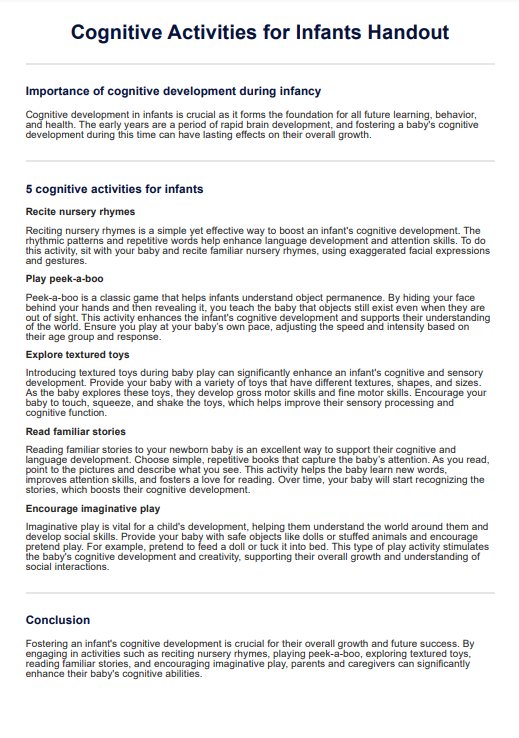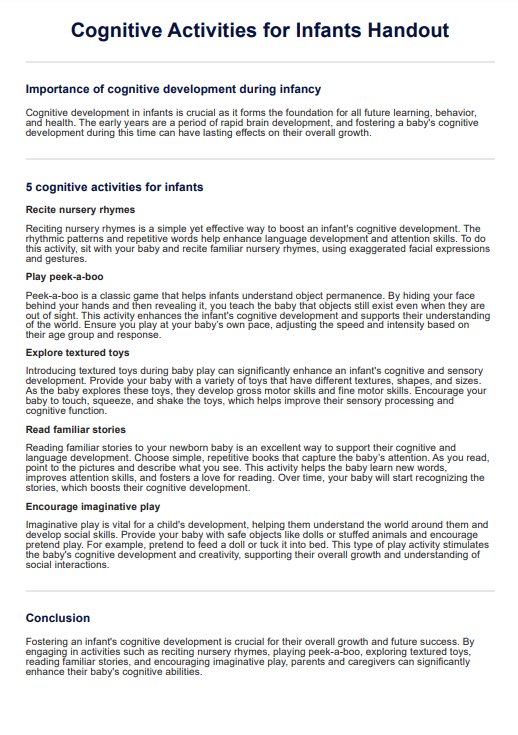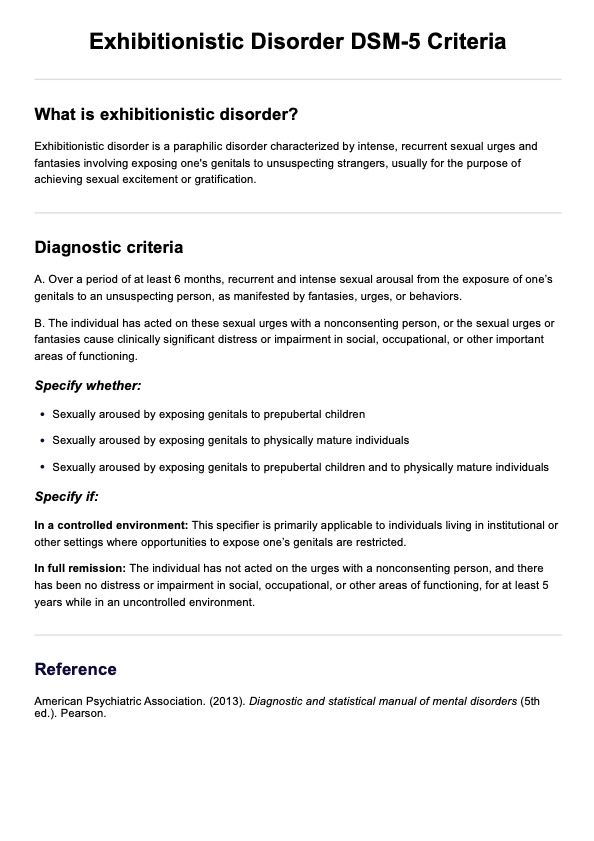Cognitive Activities for Infants Handout
Explore a variety of cognitive activities for infants to stimulate their development with Carepatron's free cognitive activities PDF.


Importance of infants developing good cognitive abilities
Cognitive development in infants is crucial as it forms the foundation for all future learning, behavior, and health. The early years are a period of rapid brain development, and fostering a baby's cognitive development during this time can have lasting effects on their overall growth. Cognitive development encompasses a child's ability to think, learn, and solve problems, which are essential skills throughout life.
Understanding infant and toddler development is vital for parents and caregivers to provide appropriate cognitive development activities. Activities like nursery rhymes and play activities help stimulate a baby’s brain, improving listening skills and fine motor skills. These activities promote cognitive development by engaging the child's cognitive skills, which are fundamental for reaching developmental milestones.
Early childhood education plays a significant role in boosting cognitive development. It provides structured environments where a child's cognitive development is nurtured through various interactive and educational experiences. For example, participating in cognitive development activities in a preschool setting can significantly enhance a child's cognitive skills, preparing them for future academic success.
Outcomes of weak cognitive abilities in infants
Weak cognitive capabilities in infants can lead to significant developmental delays and challenges in learning and social interactions. These issues may manifest as difficulties in language acquisition, problem-solving, and attention span. As a result, children with underdeveloped cognitive skills may struggle with academic performance and social integration in early childhood education settings. Early identification and intervention are crucial to address these potential problems and promote healthy cognitive development in infants.
Cognitive Activities for Infants Handout Template
Cognitive Activities for Infants Handout Sample
5 cognitive activities for infants
These activities not only boost cognitive development but also support social skills, language development, and motor skills. Here are five cognitive activities tailored to enhance an infant's function and foster holistic child development.
Recite nursery rhymes
Reciting nursery rhymes is a simple yet effective way to boost an infant's cognitive development. The rhythmic patterns and repetitive words help enhance language development and attention skills. To do this activity, sit with your baby and recite familiar nursery rhymes using exaggerated facial expressions and gestures.
Play peek-a-boo
Peek-a-boo is a classic game that helps infants understand object permanence. By hiding your face behind your hands and then revealing it, you teach the baby that objects still exist even when they are out of sight. This activity enhances the infant's cognitive development and supports their understanding of the world. Ensure you play at the baby’s pace, adjusting the speed and intensity based on their age group and response.
Explore textured toys
Introducing textured toys during baby play can significantly enhance an infant's cognitive and sensory development. Provide your baby with a variety of toys, like building blocks, sensory activities, and multisensory experiences, that have different textures, shapes, and sizes.
Read familiar stories
Reading familiar stories to your newborn baby is an excellent way to support their cognitive skills and language development. Choose simple, repetitive books that capture the baby’s attention. As you read, point to the pictures and describe what you see. This activity helps babies learn new words, improves attention, like eye contact, and fosters a love for reading. You can easily put this in their bedtime routine.
Encourage imaginative play
This type of play is vital for a child's development, helping them understand the world around them and develop social skills. Provide your baby with safe objects like dolls or stuffed animals and encourage pretend play. One good example is to pretend to feed a doll or tuck it into bed.
How to use our Cognitive Activities for Infants Handout
Medical professionals can utilize Carepatron's Cognitive Activities for Infants Handout to effectively guide parents and caregivers in supporting their infant's cognitive development. This handout provides a structured outline of various activities designed to boost cognitive function, language development, and social skills in infants.
During consultations, healthcare providers can explain the importance of each activity, demonstrating how to perform them and highlighting their benefits. The handout is a practical tool that professionals can distribute to parents, ensuring they have easy access to evidence-based cognitive development activities.
How this handout may benefit pediatricians
Pediatricians can leverage Carepatron's handout on Cognitive Activities for Infants to enhance their practice in several ways, effectively supporting both infants and caregivers.
Enhancing parent education
By providing structured cognitive activities, pediatricians empower parents with tools to actively engage in their child's development. Educating parents about the importance of activities like tummy time for motor skills and container play for decision-making skills fosters informed caregiving.
Supporting developmental milestones
The handout guides pediatricians in recommending age-appropriate activities that stimulate sensory exploration and hand-eye coordination. This support aids in tracking and promoting healthy developmental milestones crucial for early childhood.
Promoting safety awareness
Highlighting activities that avoid potential choking hazards and encourage safe play environments in the handout ensures pediatricians can educate parents comprehensively. This emphasis promotes a safe yet stimulating environment where infants can grow and learn effectively.
Commonly asked questions
Activities such as reading books with colorful pictures, playing peek-a-boo to teach object permanence, and singing nursery rhymes to enhance language skills promote infants' cognitive development effectively.
Cognitive skills for infants include object permanence (understanding objects exist even when out of sight), cause and effect understanding (such as dropping objects), and the ability to imitate simple actions or sounds.
Three examples of cognitive activities for infants are playing with stacking toys to develop hand-eye coordination, engaging in interactive games like pat-a-cake to enhance social skills, and introducing toys that make different sounds to stimulate auditory perception.







































































































